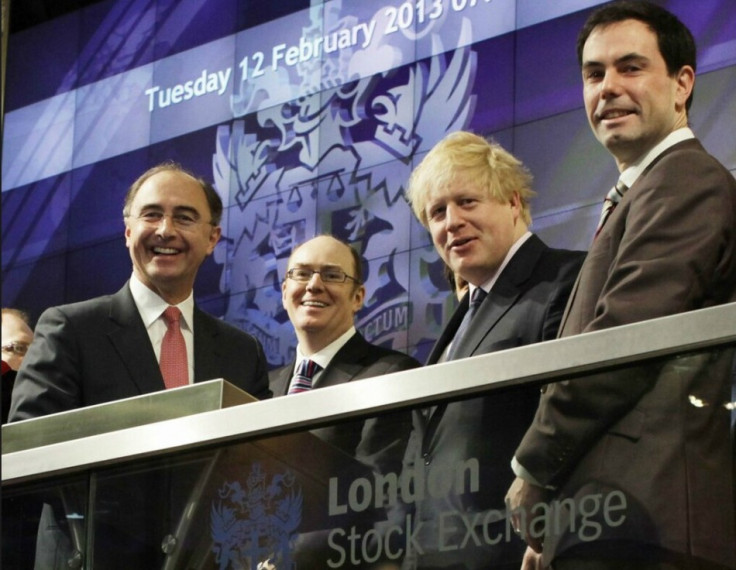Boris Johnson: Invest in London's Science and Tech Firms - or Our Competitors Will Snatch Them

The UK's science and technology sectors have received a much-needed political boost after Mayor of London Boris Johnson called for investors to pump money into the industry.
After ringing the opening bell at the London Stock Exchange on Tuesday, Johnson went on a fast and frenetic press junket to urge investors to "back London's booming science and tech sector" in order to boost innovation and ensure growth which will benefit London and wider economy.
Johnson emphasised that London is home to the greatest concentration of tech firms in Europe, and is also one of the world leading centres for life sciences.
"London is brimming with innovative technology and life science entrepreneurs, many of whom have the potential to build world beating businesses that will create thousands of jobs for our great city. However we must ensure that we provide the fertile ground these enterprises need with an environment that brings innovation together with the right investors. If we do not get it right we risk losing this high value sector to our competitors in Northern Europe and the US," the former Conservative MP added.
Johnson's rallying cry will be welcomed by the science and technology sectors, which have already borne the brunt of government spending cuts as the Coalition attempts to avert a triple-dip recession.
In November last year, individual government department spending on science was down 7.6 percent on the first year of the current parliament. Total government spending on science activities in 2011 was down 6.4 percent on the previous year, when adjusted for inflation - and this funding includes the UK's contribution to the European Union R&D budget.
Meanwhile, in Brussels, the European Union (EU) is still threatening to axe a large portion of science and technology funding in order to shore up the beleaguered region's balance sheet, following the sovereign debt crisis.
Viable Plans
While investment in science, technology, and more specifically research and development, need to be continual, Johnson emphasised that investors need to financially support these sectors to ensure that latest innovations and ideas are not "snapped up by our overseas competitors, denying the capital's economy the huge benefits they are set to deliver in the coming years."
Apart from pumping the sector with cash, Johnson outlined some viable options to stimulate the two sectors and therefore boost the UK economy.
"A reduction in taxes on equity investment to widen small to medium enterprises' (SMEs') access to equity finance, which includes proposals developed by LSE calling to abolish Stamp Duty for companies not listed on a recognised stock exchange. This will help attract a wider set of investors to growth businesses to deliver long term economic gain," he said.
Johnson also welcomed the LSE's new High Growth Segment to bridge the gap between main market and the Alternative Investment Market (AIM), the market for companies with a smaller market capitalisation.
The Mayor of London also called for new regulation that would "breakdown the perception that smaller companies are inherently more risky than larger enterprises, deterring investors from financing high-growth companies."
"The FSA should consider the impact of the restrictive Conduct of Business rules, which have the unintended consequence of preventing individual investors from buying stocks outside the FTSE 350," he adds.
Johnson and Corporate Science Funding Recognition
Although cynics may call the Mayor of London's push for science and technology funding a PR stunt, he has consistently campaigned for the recognition of such sectors since entering City Hall in 2008.
Last year, as part of the government's initiative to reinvigorate the UK's £3.3bn gaming industry through development, design and creation, Johnson held an exhibition to showcase some of the UK's most successful games of all time.
Even the Chancellor George Osborne highlighted the importance of gaming as a key contributor to the economy when he revealed in his budget statement last spring that games developers will be given tax breaks next year.
The corporate world also appears to have recognised this. Last month Google announced it would give away 15,000 free microcomputers, in a bid to nurture a new generation of coders.
Related Articles:
The Human Brain Project and Graphene: Vital Science Funding
CERN and Science Budget Cuts Are Bad for EU Economic Recovery
Cern Exclusive: Behind the Scenes With the LHC's Control Centre Physicist
It's Not Just for Play: London Exhibition Highlights UK's £3.3bn Games Industry
© Copyright IBTimes 2025. All rights reserved.






















